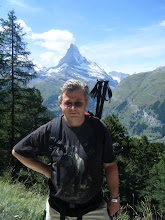Operatic cake
A seventeen-year old count is having an affair with an older woman, the bored and lonely wife of a noble field-marshal. Meanwhile, the woman's oafish baron cousin, has just got engaged to a fifteen-year old girl. While he makes it quite clear that he doesn't see this marriage curtailing his lecherous exploits, he consider's that he is doing the girl's (very rich) family a favour as they have only just been elevated to the nobility. Accordingly, he expects to be well compensated. When he consults the field-marshal's wife on the choice of a young nobleman to perform the customary office of presenting a silver rose to his fiancée he sets rolling a drama that will be funny, romantic and sad, all at the same time.
Richard Strauss's Der Rosenkavalier (the knight of the rose) is like a serving of Viennese Sachertorte. It has the bittersweet flavours of the dark chocolate and apricot, combined with the sweetness of the chocolate sponge and the richness of the accompanying whipped cream. Set in 18th-century Vienna, the music is fundamentally late romantic but with lots of nods to the Viennese waltz, and to the music of the era in which the story is set (i.e. the music of Mozart and Haydn). Properly staged, it is a feast for the eyes as well as the ears, offering the opportunity for lavish sets and costumes.
The production we saw last night ticked all these boxes. Coming to Geneva from the Bavarian State Orchestra, the first act's set (in the bedroom of the field-marshal's wife) incorporated huge elaboratly painted, wall panels and a bed set discreetly intoa recess with an overhanging canopy. The second act, in the house of the young girl's father, was a spectacular creation of glass and gilt (the third act, set in a dingy inn, doesn't offer the same scope for spectacle but was well done).
Normally when we go to the opera we can expect to hear fine music. We may even see a production that is pleasing and clever (though that is far from guaranteed - some can be downright tasteless). What is special about so many of Strauss's operas is that we can also expect a story that is subtle and clever. This is thanks to the composer's long partnership with his librettist, Hugo von Hoffmansthall; Der Rosenkavalier was their second collaboration. No other composer-librettist partnership has been so fruitful, with the possible exception of that between Mozart and Lorenzo da Ponte, which gave us Le nozze di Figaro, Don Giovani and Cosi fan tutte. However, the latter partnership was much sorter in duration; da Ponte collaborated with numerous composers and, when he wrote his autobiography after fleeing to the United States to escape debt, he never even mentioned Mozart. By contrast, Strauss and von Hoffmansthall gave us Elektra, Der Rosenkavalier, Aiadne auf Naxos, Arabella and Die Frau ohne Schatten, in a partnership that lasted nearly 3 decades - up to von Hoffmansthall's death.
You can see pictures from the production here:
http://www.geneveopera.com/production_9
Richard Strauss's Der Rosenkavalier (the knight of the rose) is like a serving of Viennese Sachertorte. It has the bittersweet flavours of the dark chocolate and apricot, combined with the sweetness of the chocolate sponge and the richness of the accompanying whipped cream. Set in 18th-century Vienna, the music is fundamentally late romantic but with lots of nods to the Viennese waltz, and to the music of the era in which the story is set (i.e. the music of Mozart and Haydn). Properly staged, it is a feast for the eyes as well as the ears, offering the opportunity for lavish sets and costumes.
The production we saw last night ticked all these boxes. Coming to Geneva from the Bavarian State Orchestra, the first act's set (in the bedroom of the field-marshal's wife) incorporated huge elaboratly painted, wall panels and a bed set discreetly intoa recess with an overhanging canopy. The second act, in the house of the young girl's father, was a spectacular creation of glass and gilt (the third act, set in a dingy inn, doesn't offer the same scope for spectacle but was well done).
Normally when we go to the opera we can expect to hear fine music. We may even see a production that is pleasing and clever (though that is far from guaranteed - some can be downright tasteless). What is special about so many of Strauss's operas is that we can also expect a story that is subtle and clever. This is thanks to the composer's long partnership with his librettist, Hugo von Hoffmansthall; Der Rosenkavalier was their second collaboration. No other composer-librettist partnership has been so fruitful, with the possible exception of that between Mozart and Lorenzo da Ponte, which gave us Le nozze di Figaro, Don Giovani and Cosi fan tutte. However, the latter partnership was much sorter in duration; da Ponte collaborated with numerous composers and, when he wrote his autobiography after fleeing to the United States to escape debt, he never even mentioned Mozart. By contrast, Strauss and von Hoffmansthall gave us Elektra, Der Rosenkavalier, Aiadne auf Naxos, Arabella and Die Frau ohne Schatten, in a partnership that lasted nearly 3 decades - up to von Hoffmansthall's death.
You can see pictures from the production here:
http://www.geneveopera.com/production_9


0 Comments:
Post a Comment
Subscribe to Post Comments [Atom]
<< Home